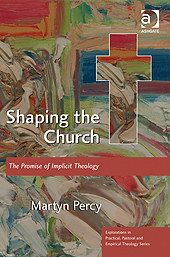Martyn Percy, Shaping the Church
 Martyn Percy, Shaping the Church: The Promise of Implicit Theology, Explorations in Practical, Pastoral and Empirical Theology Series (Burlington, VT: Ashgate, 2010), 193 pages, ISBN 9780754666004.
Martyn Percy, Shaping the Church: The Promise of Implicit Theology, Explorations in Practical, Pastoral and Empirical Theology Series (Burlington, VT: Ashgate, 2010), 193 pages, ISBN 9780754666004.
Martyn Percy, Principal of Ripon College Cuddesdon and professor at King’s College and Heythrop College London, and the Church of England’s Oxford Ministry Course (for equipping ordinands), adds to his publications on theology and the Anglican Communion. Shaping the Church is presented as a sequel to his interdisciplinary ecclesiological proposal, Engaging with Contemporary Culture (2005). The earlier publication presents ecclesiology in conversation with anthropology, sociology and cultural studies whilst the book currently under review explores ecclesiology in relation to sacramentality, church growth, and ministry/practical pastoral theology particularly when these areas concern church missions, leadership formation and church polity within the Anglican Communion, especially in England. This book makes at least three important contributions to ecclesiology: Percy offers his insights on constructing an ecclesial theology (that listens to culture, theology, pastoral and congregations), on reframing church growth in a culture of consumerism, and on sustaining Anglican unity amidst problems that threatened to divide this global communion.
First, Percy argues for the importance of theologizing from the ground up (what he calls implicit theology) rather than the dominant approach of theologizing from official documents and texts, and with this proposal, he indirectly corrects a common perspective that theology is meaningful only when performed by clerics and/or professional theologians. According to Percy, “implicit theology … is deduced from operant religious practice rather than formal religious propositions” (p.6). Official theological statements often do not determine how churches engage culture. Percy rightly observes that beliefs and practices at the ground are often a result of theology lived in culture (albeit without passing the rigor of theologians’ processes) and as such the churches’ emergent experiences are “natural texts” for theological reflection. Implicit theology opens up vistas for examining the perplexing reality of church life, thereby providing possibilities for reconfiguring ecclesial life and a theology of the church. Simply put, practical theology has much to say to the systematic theological reflection of ecclesiology because culture interfaces with theology and church life more often than has been acknowledged by academic theologians. For instance, Percy traces three different views of baptism and shows that each position reveals a nascent theory of how churches shaped their own identity, which is not written in official documents. Percy also shows how culture influences churches’ views on the theology and practice of confirmation and/or conversion—which becomes crucial as churches think about their role in the process of discipleship.
Second, Percy reframes a theology of church growth against the backdrop of recent alternative church growth practices found in England (known by the name, “Fresh Expressions”). As secularity becomes the dominant character that defines society and as Christian signs and practices lose their grip on society (which is fast becoming secular), declining church attendance is to be expected. But the Principal suggests that the data is no cause for alarm. Even if people do not attend churches, they still relate to the church indirectly. While Grace Davie (1994) describes this ambivalent group as those in the camp of “believing but not belonging” (p.47), Percy calls them those who are “relating and mutating” (p.52). Even if people do not attend churches, they implicitly relate to the church; only very few people would choose to have absolutely no relationship with the church; and so the statistics of declining church attendance barely paints an accurate picture of membership and/or the organic growth of Christianity in these churches. He further demonstrates from the history of English Christianity that the English believe in God but are not active in the church—they support the church from outside and not as pillars of the church (p.60-61). On that note, Percy urges that churches should relax rather than to be uptight about employing aggressive church growth strategies; they should trust the resilience of religion to work itself out. He however reminds the churches that they must respond to society by offering ministry to those in need.
Category: Ministry, Pneuma Review, Summer 2012


